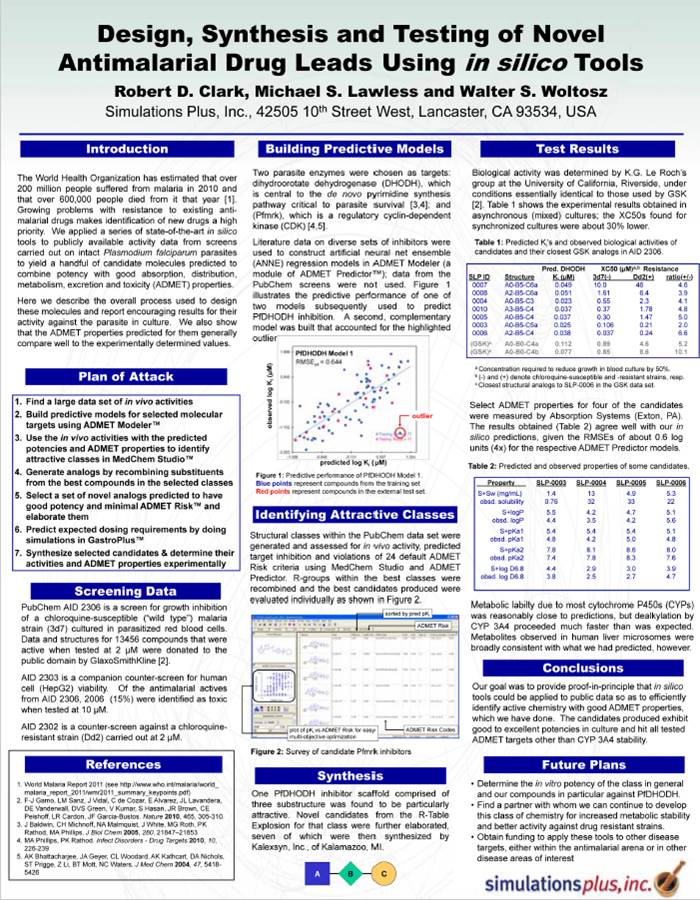Prolonged use of proton pump inhibitors has reportedly caused rare clinically symptomatic hypomagnesemia.

Application of ED-optimality to screening experiments for analgesic compounds in an experimental model of neuropathic pain
In spite of the evidence regarding high variability in the response to evoked pain, little attention has been paid to its impact on the screening of drugs for inflammatory and neuropathic pain.

Optimised protocol design for the screening of analgesic compounds in neuropathic pain
We have previously shown how screening experiments for neuropathic pain can be optimised taking into account parameter and model uncertainty.

The Worst Job In Pharma
Being the Team Leader of an R&D team might not be down at the level of some of the jobs on Mike Rowe’s Dirty Jobs on TV’s Discovery Channel, but I nominate it as the worst job in Pharma.

Toxicological considerations of acetylcholinesterase reactivators
The more or less systematic studies on the specific activity of oximes as reactivators of acetylcholinesterase (AChE) inhibited by organophosphorus (OP) compounds...

Integrated Pharmacokinetic-Driven Approach to Screen Candidate Anticancer Drugs for Brain Tumor Chemotherapy
The goal of the study was to develop an effective screening strategy to select new agents for brain tumor chemotherapy from a series of low molecular weight anticancer...

Simulations Plus Reports FY2012 and Fourth Quarter FY2012 Financial Results
Fiscal Year Pharmaceutical Software and Services Up 8.1%, EPS Up 11.1%

Simulations Plus Sets Date for 4th Quarter and Fiscal Year 2012 Earnings Release and Conference Call
Conference Call to be on Monday, November 19, 2012, at 4:15 PM EST

Simulations Plus Announces Next Quarterly Cash Dividend
Company declares cash dividend of $0.05 per share

Dynamic Change of Heme Environment in Soluble Guanylate Cyclase and Complexation of NO-Independent Drug Agents with H-NOX Domain
Soluble guanylate cyclase is a heterodimer receptor that functions in several signal transduction pathways. Conversion of guanosine 5'-triphosphate to...

Nilotinib preclinical pharmacokinetics and practical application toward clinical projections of oral absorption and systemic availability
Nilotinib is a highly potent and selective bcr-abl tyrosine kinase inhibitor used for the treatment of patients who are in the chronic and accelerated phases of...

ADMET Design Suite™ Webinar
This webinar provides an introduction to an in silico lead optimization process that begins with high throughput screening data via class generation, R-group analysis, scaffold hopping, activity cliff detection...

Simulation of the pharmacokinetics of bisoprolol in healthy adults and patients with impaired renal function using whole-body physiologically based pharmacokinetic modeling
To develop and evaluate a whole-body physiologically based pharmacokinetic (WB-PBPK) model of bisoprolol and to simulate its exposure and disposition...

Design, Synthesis and Testing of Novel Antimalarial Drug Leads Using in silico Tools
The World Health Organization has estimated that over 200 million people suffered from malaria in 2010 and that over 600,000 people died from it that year [1]. Growing problems with resistance to existing anti…

PBPK Model Simulation of CYP3A4 and Transporter Mediated Drug-drug Interactions Involving Erythromycin
Erythromycin, a macrolide antibiotic, is cleared primarily by cytochrome P450-3A4 metabolism to the N-demethylated metabolite and C-formaldehyde. Its uptake into hepatocytes is mediated by organic…

Novel Antimalarial Drug Candidates Generated in silico by Analysis of Public HTS Data
Carry out a prospective experiment to demonstrate the ability of in silico drug design tools to design new lead drug candidates from phenotypic screening data.

Prediction of Amoxicillin Pharmacokinetics in Populations with Altered Renal Function
Purpose of the study was to predict amoxicillin pharmacokinetics in populations with altered renal function to further validate an absorption/PBPK model for amoxicillin.

Physiologically Based Pharmacokinetic (PBPK) Modeling of Amoxicillin Absorption and Pharmacokinetics
Purpose of the study was to develop a PBPK model for amoxicillin incorporating saturable transport processes affecting the drug’s absorption and distribution.

PBPK Modeling of Erythromycin Absorption and Disposition Mediated by Transporters in Humans
Erythromycin, a macrolide antibiotic, is cleared primarily by cytochrome P450-3A4 metabolism. Its uptake into enterocytes and hepatocytes is mediated by organic anion transporter (OAT) and organic anion…

Simulations Plus Joins European Consortium on Development of Oral Bioavailability Tools (OrBiTo)
Simulations Plus is the only non-European company invited to consortium
